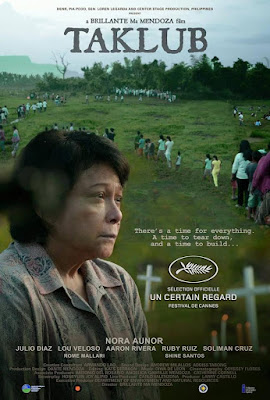TAKLUB (Brillante Mendoza, 2015)
English title: "Trap"
Tragedy is a very delicate subject matter for film. If done inappropriately, the filmmaker is prone to either sensationalism or emotional detachment. "Taklub" borders closer on the latter.
The film opens with a tracking shot of the typhoon Yolanda aftermath in Tacloban, and cuts to a fire consuming one of the refugee tents in the makeshift "Tent City" community. People scamper to put the fire out with pails of water, as we see a familiar figure emerge in the dizzying darkness. It is Nora Aunor, who plays one of the displaced residents during the storm.
Filmmaker Brillante Mendoza exhibits early on his penchant for visual irony, when a fire causes the death of an entire family of storm survivors, sans the patriarch. Fire, as opposed to water. Water, which is supposed to give life, yet caused the deaths of thousands.
Slowly, "Taklub" introduces us to its assortment of characters. Bebeth (Aunor) runs a rundown roadside eatery with her young daughter (Shine Santos). The faces of children printed in mugs in Bebeth's kitchen readily tell us that she has other kids.
Larry (Julio Diaz) is a father who lost his wife during the storm. A church regular, he finds himself at odds with his faith, literally finding his "cross" too heavy to bear.
Renato (Lou Veloso), a fisherman, perhaps has the biggest burden of all, finding out that his family survived the typhoon only to be consumed in a fire accident. Veloso stands out among all of the other actors, even outshining Nora Aunor in almost every scene he's in. At one point, Renato said he wanted to be consumed by the sea, since he has nothing left to live for, and Veloso interprets his character's surrender with a blank stare into nothingness.
Meanwhile, Erwin (Aaron Rivera) and Marlon (Rome Mallari) are brothers who have to deal with the death of their parents, trying to rebuild their home from scratch.
However, "Taklub" holds the idea that no single suffering is greater than the others.
"Taklub" is a praiseworthy film, only if for its refusal to prey upon the suffering of Yolanda victims. Despite the film's government backing, it doesn't force feed the viewer into any advocacy, or political agenda. Mendoza and screenwriter Honeylyn Alipio vividly respect their characters' pains.
What I would have wanted from the film though is a more involved storytelling rather than fragments of shared pain, which is the only connecting thread between its characters. Mendoza is known to favor minimalism in his approach, but we should be allowed to dig deeper into the inner workings of Bebeth, Renato, Larry and company. Despite an end credits recognition of the real men and women behind the characters, "Taklub" served as another passing anecdote on Yolanda, when it fact it had the potential to be the definitive commentary on the matter, like what Mendoza's previous films achieved. Personally, I think the subject of the Yolanda disaster deserved a more personal relationship with the characters, in terms of treatment.
Despite its shortcomings, the film has its magical moments. In the scene where Bebeth visits Renato in the hospital, the close-up shot of Nora Aunor looking at an anguished Lou Veloso revealed a whole lot more than the entire dialogue combined. Aunor's eyes are at work once again, telling a multitude of stories in just a single frame.
RATING: 3/5


Comments
Post a Comment